Human Flower Project
Totality
Overcoming alienation: John Levett furthers the revolution thirty minutes a day.
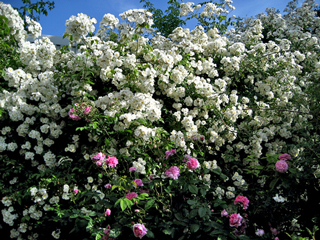
Bobby James and Félicité Parmentier
Photo: John Levett
By John Levett
There’s an oft-quoted passage of Karl Marx that goes as follows: “as soon as the distribution of labour comes into being, each man has a particular, exclusive sphere of activity, which is forced upon him and from which he cannot escape. He is a hunter, a fisherman, a herdsman, or a critical critic, and must remain so if he does not want to lose his means of livelihood; while in communist society, where nobody has one exclusive sphere of activity but each can become accomplished in any branch he wishes, society regulates the general production and thus makes it possible for me to do one thing today and another tomorrow, to hunt in the morning, fish in the afternoon, rear cattle in the evening, criticize after dinner, just as I have a mind, without ever becoming fisherman, herdsman or critic.”
It’s a passage about human creative potentialities where the human being “…does not reproduce himself in one specificity, but produces his totality…Strives not to remain something he has become, but is in the absolute movement of becoming.”
They’re fine passages omitting only the recognition that hunting, fishing, cattle rearing, criticizing and becoming are also available to women.
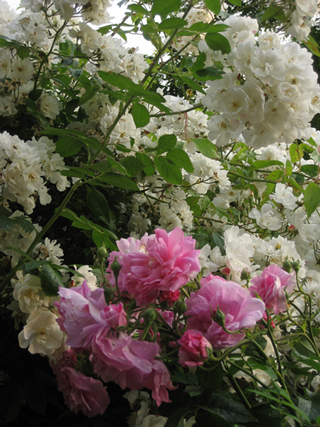 Bobby James and Félicité Parmentier
Bobby James and Félicité Parmentier
Photo: John Levett
Three things brought me back to Marx’s unalienated world. The first was listening to a talk by Sheila Rowbotham at this Summer’s Marxism Conference in London. She has a fine way of writing biography that incorporates a sympathy for the idiosyncratic and a fine appreciation of the utopian. Each year at Marxism I always feel there is an undertow of ‘a love that dare not speak its name’ and that name is ‘Utopianism.’
Sheila Rowbotham understands that well vide her biography of Edward Carpenter. I still have vivid, joyful memories of tramping the second-hand bookshops of England looking for the output of and about Carpenter, Salt, Besant, Webb (Beatrice), Shaw, Morris, Marx (Eleanor), Howard, Blatchford and assorted ‘sandal-wearing, fruit-juice drinkers.’
Sheila has recently published Dreamers of a New Day, a work on radical, innovative and transformational action by women on the cusp of the Twentieth Century. Such is the quality of her writing that I recently started seeking out her own back catalogue from the wave of militancy in the late ‘60s-early ‘70s. Reading her work now and then I recognise the congruence between the women she now writes about and the women she then wrote about—the world to be gained.
I’m also reading David Kynaston’s Austerity Britain 1945-51—the moment of the post-war New Jerusalemism. I’m currently doing a lot of going backwards but it’s ‘backwards with a purpose’; it’s connecting up to a tradition. I am highly skeptical of the ‘switch-off-a-lightbulb-and-save-the-planet-and-teach-the-world-to-sing-at-the-same-time’ approach to current crises and of happy-clappy appropriation of the ideas of long-dead socialists who got their heads cracked in and out of jail without twittering while it happened or capturing their best side on their iPhone.
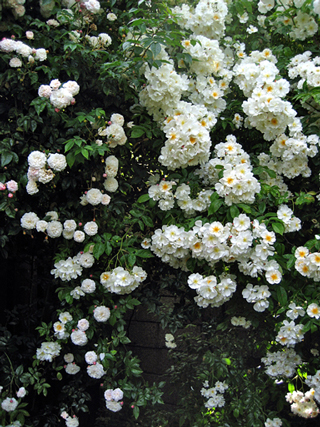 Bobby James &
Bobby James &
Félicité Perpétue
Photo: John Levett
The second thing that returned me to Marx’s vision of ‘totality’ was my upstairs neighbour. I’ve never seen him happier. He’s just acquired an allotment on a plot a couple of miles away. I never took him to be a gardener, more a five-pints-a-night-plonked-out-in-front-of-the-football kind of guy. But not so. He’s roped in his extended family; bought a shop-full of seed; invested in spade, fork and rake; he’s off and running. His eldest son works for a tree surgery and landscaper so he’s not wanting for mulch (nor is the rest of the tribe of plot-holders) and he’s been down there after work most nights since the start of Spring.
The whole allotment experience has transformed him. The key, I’m guessing, is working alongside and with others. There exists an Allotment Death Syndrome. It starts in the mind alongside the New Jerusalem thing—the picture in the head, the planning, barrowing-off to the sunny uplands, wholesome toil, ethical self-sufficiency, Dig For Victory, health and virtue. And then the season turns and the poetry turns to drudge; more the mediaeval cottar behind the wooden plough than the smocked small-holder; more ‘Heart of Darkness’ than ‘Cider With Rosie.’ Dawn comes later and the evenings draw in; the trudge to the plot holds less promise; the couch grass now triffid-like in its inexorable encroachment. Don’t do it alone; get the strength of others alongside; grow taller from the transformative uplift of one’s fellow plot-holders. My neighbour has all that; in fact I think he’s cultivating a small business plus a social club judging from the produce he’s sharing out. He’s got less time for criticism after dinner but I’m guessing dinner’s sweeter these evenings.
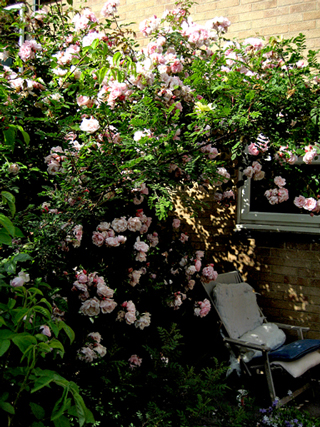 Albertine
Albertine
Photo: John Levett
The third thing that brought me back to Marx’s ‘absolute moment of becoming’ was sitting in the garden. I think the success of a garden lies in finding an answer to the question ‘How much does my garden mean to me?’ Now, ‘success and ‘mean’ are infinitely discussable and without resolution apart from within ourselves.
‘Success’ in my garden means ‘comfort.’ Not ‘comfort’ in the way of a favourite chair but ‘comfort’ in the way of enclosing me; enclosing me physically, enclosing me mentally, enclosing me historically.
Physically my garden shuts me in and the world out. That’s a bit of wishful thinking given that I live on a dense housing estate, next to a warehouse and on the flight path of traffic in and out of Cambridge airport. But I can still recognise that I’m here and the rest are outside it and I can pretend that I’m cut off. I need cut off; I need arrangements that are mine despite the impositions from outside. I go into the garden at times to be away from the bits I’ve had enough of inside. Inside is left-brain; outside is right.
Mentally, I get to think differently in my garden. I’ll sit; I’ll sit with note-pad and pen; I’ll sit with sketch-pad and a multitude of felt-tip pens; I’ll sit with a difficult text; I’ll sit outside and try to put aside the check-list inside. I read differently in my garden; inside feels like study, outside feels like discovery; inside feels like a task, outside feels like playtime.
Historically, I place myself within my lifetime when I’m in my garden. What I grow is roses as my family has always done. I grow the same roses that were grown in the landscapes of the eighteenth century and in Gertrude Jekyll’s of the late nineteenth; the same roses as the Reverend Joseph Pemberton in Essex in the early twentieth; the same roses as Uncle Jack and Auntie Beattie in Cherry Tree Road in the 1930s. It’s also where I put my life together: a place where I remember how things were with me when I began digging it; a place where I remember how things were last January.
I think it’s the January remembrance that uplifts me most. The death of the garden, as with the allotment plot, is the putting-off. I don’t put off. I cultivate the thirty-minute garden; if necessary the ten-minute garden. Whatever needs to be done gets done minute by minute—prune one rose, water one pot, sweep one path, hoe one square metre, tie in one shoot. I have a friend who mounts a D-Day invasion each Spring and goes into traction shortly after. My method has no influence with her; I just take bread and cheese round or a bun.
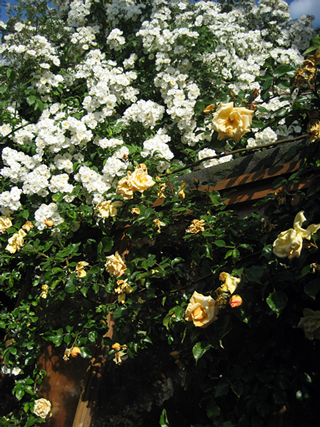 Rambling Rector and Emily Gray
Rambling Rector and Emily Gray
Photo: John Levett
The thirty-minute garden takes me from January to high Summer (this year we’re having a high Summer for a while). Thirty-minutes, more or less, on days that I’m at home gets it done. That way it doesn’t look impossible; does raise the spirit especially at that moment when it all comes together. And my garden comes together. Briefly all together.
‘Canary Bird’ comes in the second week of April and ‘Chapeau de Napoléon’ puts out its last blooms in the last week of July. That’s how it is with my garden but then the gardening year starts. Most of my roses need Summer pruning (the same technique as Winter pruning but with fewer layers of clothing), feeding to encourage new growth that can harden before Winter and the forever clearing out of dead wood. There’s often a lot of that. The climber-ramblers I leave to their own devices which means that they climb-ramble off the wall supports and create dense shadow underneath; hence, little growth that survives underneath.
I also need other plants. I gripe about this frequently. In March, I think it was, I planted delphinium seed. I’ve now got forty-six plants. I’ll need to keep a watch during the winter but will have spikes next year. Next Spring I intend to start collecting rock plants again which means a trip up to Potterton’s in Lincolnshire. I’m looking forward to that. I’ll cross the Humber to Larkin country and then into Winifred Holtby territory in ‘South Riding’ (I’ve just found Vera Brittain’s ‘Testament of Friendship’ about their relationship). These things come when pottering.
Comments
Still reading but just wanted to let you know that the Marx quote really drew me in!
Marx drew me in but “I cultivate the thirty-minute garden; if necessary the ten-minute garden. Whatever needs to be done gets done minute by minute” made me smile!


Great post! I am going to share on Facebook and Twitter right now.